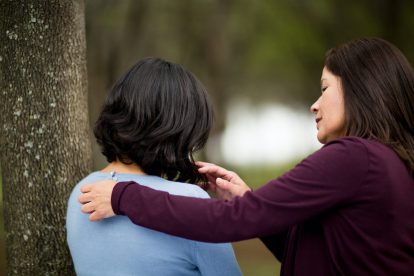Heroin Addiction Stories: Helping a Family Member Overcome Denial

It’s hard to help people who don’t realize they’re in trouble, so when family members are addicted to heroin, helping them overcome denial is essential. You can’t make your loved one see the truth, but there are things you can do to help the process along.
Each person and addiction journey is unique and every family has its own dynamics. On the other hand, family members of people addicted to heroin often have very similar stories. They often report that one of the first challenges they faced was knocking down the roadblock of denial.
Denial Can Be a Family Affair
Sometimes, before helping a family member overcome denial you have to face your own. It’s not easy to see what you don’t want to believe. Stories like these are common:
I always heard that denial was a big part of addiction, but I didn’t realize that meant mine as well as my son’s. No one wants to believe their kid is doing drugs, and heroin still has such a stigma attached that maybe that makes it even harder to accept.
**
I made excuses for my wife’s behavior for so long. One day I finally realized what the stakes really were and it jolted me.
**
It’s so easy to justify things. She’s just going through a phase or she’s just experimenting. Now I know that if I find myself saying ”just” too often, it may be because I’m “just”ifying.
Overcoming denial that your family member is in trouble involves being willing to look at the situation objectively. Sometimes it helps to imagine what you would feel or believe if your loved one was a stranger to you. If a friend told you a story about someone behaving the way your family member does, what would you think?
The Confused Brain
Conquering your own denial is generally a process, but it tends to be a much more involved and difficult one for the person struggling with addiction. When someone is addicted to heroin they use it compulsively and they keep using it despite negative consequences. People can deny either part of that equation. They can deny they’ve lost control and say they can stop whenever they want. They can also deny that there’s any significant downside to their heroin use.
Denial can be a psychological defense mechanism. In the case of addiction, though, it may also occur because drugs like heroin affect the brain, including areas involved with self-awareness and memory. Sometimes people really don’t remember the negative consequences they’ve experienced, or they don’t connect them to their heroin use. Family members share their thoughts:
My daughter has always been bright and done well in school. It was hard for me to believe she really didn’t think she was addicted. I thought she was just willfully choosing to defy me.
**
How can things that seem so obvious to the rest of the world be hidden from the person that’s most affected? It’s just crazy.
Facing the Consequences
Sometimes people don’t see or feel the consequences of their addictive behavior because they’re protected from them. Unfortunately, it’s easy for actions that are born from love and concern to turn into behaviors that enable addiction to continue or that make it easier. As hard as it is, sometimes loving someone means taking a step back and letting them feel some pain.
Calling in sick for my husband when he was too messed up to work seemed like the right thing to do. I didn’t want him to lose his job because it would affect me as much as him. On the other hand, not helping him face his problem affected me, too, because his addiction just kept getting worse.
**
How can you not give your kid money for rent when you think she’s going to end up on the streets if you don’t? No parent wants to see that.
Obviously, family members have to decide on a case by case basis when it really does make sense to step in and protect people from themselves. It would never be a good idea, for instance, to let people drive when high. There are ways to help people face consequences, though, that don’t put their physical safety at risk.
What finally got my daughter’s attention was when I stopped helping her get into bed when I found her asleep on her bedroom floor. Somehow, waking up on the floor made her see her life for what it was.
**
One of the hardest things my husband and I ever did was to choose not to bail our son out when he got into legal trouble. I was afraid he would hate us forever, but he did eventually understand and even thank us.
Fear is a common motivation behind protective and enabling behaviors. Heroin addiction is a serious condition with serious consequences, so the desire to protect your loved one in any way you can make perfect sense. You may also worry about how your life might be affected if a family member loses a job or gets kicked out of school. What will people think if word gets out? Choosing to let your loved one face the ramifications of heroin addiction takes a great deal of courage, but doing anything else tends to be ultimately counterproductive.
Taking Action
It’s best when people recognize on their own that they’re addicted, but that’s not the only way that people can get the help they need. The National Institute on Drug Abuse points out that treatment doesn’t need to be voluntary to be effective. Family members can provide external motivations to help get their loved ones into treatment, and once they’re there, the brain can heal enough for them to develop their own internal desire to get and stay clean.
Even at his worst, my husband still loved the kids, so when I took them and moved out, it got his attention. I said he couldn’t see them unless he went to rehab, and it worked, even though he was still saying he wasn’t an addict. He’s clean now and we’re back together and life is good.
Because willingness to tackle addiction can come and go, it’s a very good idea for family members to research heroin addiction treatment centers and programs and be ready with a plan of action. The minute your loved one agrees to inpatient heroin rehab is the minute to start making it happen. If there’s a delay, the moment of opportunity may be lost, and the consequences for inaction are too great to let that happen.
Alta Mira offers comprehensive treatment for people struggling with drug and alcohol addiction as well as co-occurring mental health disorders and process addictions. Contact us to learn more about our renowned Bay Area programs and how we can help you or your loved one start the journey toward lasting recovery.






